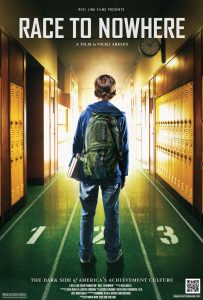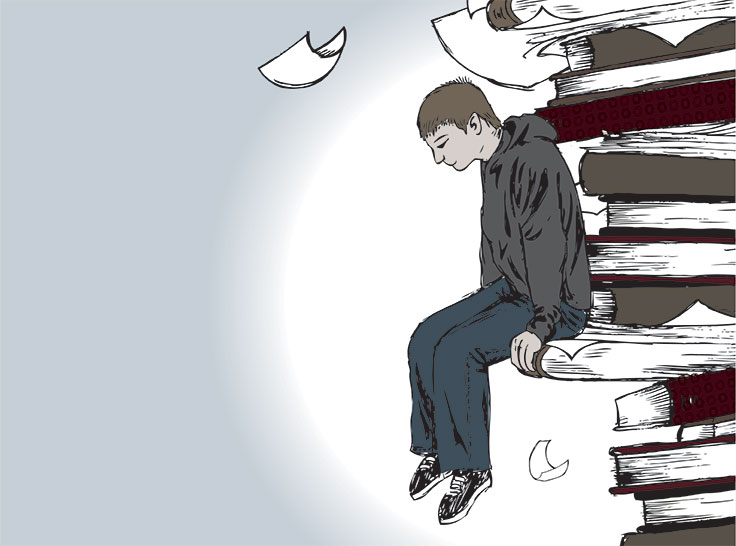The Pressures on Our Kids on the Road to Success
by Alicia Wanek
Recently, I had the opportunity to see a screening of the 2010 documentary, Race to Nowhere, at Plano’s Shepton High School, and it has dramatically altered the way I look at the demands on my four children. The film is an honest and in-depth look at our society’s pressure on our children to “achieve”—and the consequences it is having on their emotional and physical health.
It’s what we all want—for our children to be successful adults. We want them to have every opportunity to be all they can be, so we encourage them to do their best at school and to participate in sports, extracurriculars, religious groups and community organizations. The demands on our children are greater than ever. We often think that the better they do, the more choices they will have. But at what cost? The film suggests that, as parents, we are encouraging all of this in order to secure our children’s happiness, but we may be making them miserable along the way.
Dr. Sandy Gluckman, a local behavior and health coach, says, “The stress and pressure placed on our kids today is bigger than ever before and will only get more challenging.” Dr. Dean Beckloff, of the Beckloff Pediatric Behavioral Center agrees. He’s seen big changes in his 25+ years working with teens. “The pressures are not the same,” he says, “and I’m convinced our culture has not done a good job at ‘growing’ our kids.”
Is your child able to handle it all? CLICK HERE for the online Time Management Activity to help gauge your child’s time.
Our teens and pre-teens are handling an amazing amount of stress, and parents generally agree that often the culprit is the amount of homework. By the time teens get home from school, go to their after-school activities, eat dinner and shower, they’re not getting to their homework until the time they should probably be getting to bed. In the film, Wendy Mogel, PhD says teens need 9 to 11 hours of sleep but are getting far fewer. Kids are overscheduled and tired, and they are experiencing physical ramifications of the lack of sleep from headaches and stomachaches to joint pain. It becomes a vicious cycle because they are too tired to pay attention and be productive at school, which leads to more homework. Dr. Beckloff says, “the rhythms of sleep are incredibly powerful in helping to manage stress, but sleep can’t help if teens are not getting it.”
More concerning in many respects, is the emotional ramifications of this stress. Dr. Kenneth Ginsburgh, a doctor of adolescent medicine says, “The driving force for negative behaviors is stress.” Today, there has been an increase in suicide for the first time in decades, and more and more teens are cutting themselves. Frequently, these are not the “troublemakers” but the teens with the 4.0 GPA and the mature social skills. They are overwhelmed by all the demands and react in dramatic ways. Dr. Beckloff reminds us that the teen brain is still in development. The frontal lobe is not finished maturing in an 18-year old, and into our mid 20’s our brain is still growing to be able to take on stress. We sometimes forget they aren’t truly “young adults.”
Is there too much homework? The film has an obvious bent toward the affirmative. One therapist suggests we’ve “stolen” kids’ 11th and 12th grade years with all of the academic pressures, especially from AP courses and college preparation. Repeatedly, teens reported they didn’t have enough time to sleep or spend time with friends because of the amount of homework they are handling. A California teacher interviewed in the movie believes schools are taking away the joy of learning in the process and that the culture of education today will “further roboticize and mechanize academic competitors.” Another teacher asks, “When did schools get to dictate what happens when kids go home?” And is the increased homework helping them academically? Not necessarily, especially when you consider that many countries that outperform the U.S. academically have much less homework than we do.
As much as we want our children to succeed, ultimately, we all want to see them as happy and productive adults. Dr. Gluckman believes we have to focus on their spirit, that part of them that comes from the inside and helps them to establish their identity. “Knowing who I am and being proud of myself, having self-confidence and high self-esteem begins with having a healthy spirit,” she says. And according to Dr. Beckloff, “No one knows better the pulse of their child than the parent.” He points out that some kids are able to handle more than others, too, and we should model what we expect from our kids. After all, we’re under a lot of stress, too.
Dr. Beckloff says to go with your parental instinct. As parents, you know when “something’s not quite right.”
He suggests you:
1. Be aware of how your children are functioning in different situations—are they engaged at church, socially, in other situations outside of school?
2. Do they have at least one friend? Some kids thrive on a large social group; others prefer one or two close friends. Either is okay.
3. Look at grades as an indicator. Some kids just give up because they feel they can’t measure up no matter how hard they try. If grades start falling suddenly, it could be an indicator of concern.
4. Have discussions with your children about sleep, healthy eating and use of technology and let them participate in the decision-making. You may feel like it goes in one ear and out the other, but they do generally take in more information than they care to admit.
ABOUT THE FILM

“Race to Nowhere” is a film that calls us to challenge current thinking about how we prepare our children for success. Named by TakePart.com as one of “10 Education Documentaries You Don’t Want to Miss”, “Race to Nowhere” brings communities together to spark dialogue and galvanize change in America’s schools. See more at racetonowhere.com.
Featuring the heartbreaking stories of students across the country who have been pushed to the brink by over-scheduling, over-testing and the relentless pressure to achieve, “Race to Nowhere” points to a silent epidemic in our schools. Through the testimony of educators, parents and education experts, it reveals an education system in which cheating has become commonplace; students have become disengaged; stress-related illness, depression and burnout are rampant; and young people arrive at college and the workplace unprepared and uninspired.
Shown nationwide and internationally in more than 7,000 schools, universities, cinemas, hospitals, corporations and community centers, “Race to Nowhere” has become the centerpiece of a nationwide, grassroots movement for the transformation of education.

Katie Couric interviews director Vicki Abeles at cbsnews.com/videos/katiecouric-race-to-nowhere
“Over-scheduled, stressed-out kids aren’t just less competitive, they are miserable. One study found that 15% of U.S. high school students had seriously considered suicide. This film is a poignant reminder that straight A’s and high SAT scores are not the Holy Grail. We all want our kids to excel, but I’d take a happy child over a ‘depressed success’ any day of the week.”
– Katie Couric, former CBS News Anchor and talk show host


